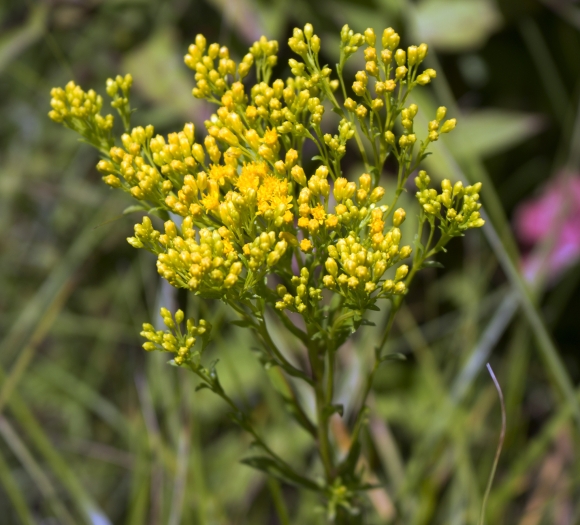Ohio Goldenrod
(Solidago ohioensis)
Ohio Goldenrod (Solidago ohioensis)
/
/

aarongunnar
CC BY 4.0
Image By:
aarongunnar
Recorded By:
Copyright:
CC BY 4.0
Copyright Notice:
Photo by: aarongunnar | License Type: CC BY 4.0 | License URL: http://creativecommons.org/licenses/by/4.0/ | Rights Holder: aarongunnar | Publisher: iNaturalist | Date Created: 2017-07-27T13:55:45-07:00 |

















































Estimated Native Range
Summary
Solidago ohioensis, commonly known as Ohio Goldenrod, is a deciduous perennial herb native to wet meadows, shores, fens, and prairies in the Central and Eastern United States, particularly in the Great Lakes region. It typically grows to a height of 3-4 feet (0.9-1.2 meters) and a width of 2-3 feet (0.6-0.9 meters). Ohio Goldenrod forms clumps of narrow, lance-shaped leaves, with small, bright yellow flowers that bloom in dense, flat-topped clusters from late summer to fall, providing a showy display that attracts pollinators.
Ohio Goldenrod is valued for its vibrant yellow flowers that add late-season color to gardens and naturalized areas. It is often used in wildflower gardens, rain gardens, and as part of restoration projects for native habitats. The plant is relatively easy to maintain, tolerating a range of soil conditions, though it prefers moist, well-drained soils. It thrives in full sun but can tolerate partial shade. While generally not aggressive, it can spread through rhizomes and self-seeding, so some control may be necessary to prevent unwanted spread. Ohio Goldenrod is also known for its resistance to many common plant diseases and its ability to support a variety of wildlife, including butterflies and bees.CC BY-SA 4.0
Ohio Goldenrod is valued for its vibrant yellow flowers that add late-season color to gardens and naturalized areas. It is often used in wildflower gardens, rain gardens, and as part of restoration projects for native habitats. The plant is relatively easy to maintain, tolerating a range of soil conditions, though it prefers moist, well-drained soils. It thrives in full sun but can tolerate partial shade. While generally not aggressive, it can spread through rhizomes and self-seeding, so some control may be necessary to prevent unwanted spread. Ohio Goldenrod is also known for its resistance to many common plant diseases and its ability to support a variety of wildlife, including butterflies and bees.CC BY-SA 4.0
Plant Description
- Plant Type: Herb
- Height: 3-4 feet
- Width: 2-3 feet
- Growth Rate: Moderate
- Flower Color: Yellow
- Flowering Season: Summer, Fall
- Leaf Retention: Deciduous
Growth Requirements
- Sun: Full Sun
- Water: Medium, High
- Drainage: Medium, Fast
Common Uses
Bee Garden, Bird Garden, Butterfly Garden, Deer Resistant, Hummingbird Garden, Low Maintenance, Rabbit Resistant, Showy Flowers, Water Garden
Natural Habitat
Wet meadows, shores, fens, and prairies in the Central and Eastern United States, particularly in the Great Lakes region
Other Names
Common Names: Verge D’Or D’Ohio, Verge D’Or De L’Ohio, Ohiogullris
Scientific Names: , Solidago ohioensis, Oligoneuron ohioense, Oligoneuron ohioensis, Aster ohioensis,
GBIF Accepted Name: Solidago ohioensis Riddell